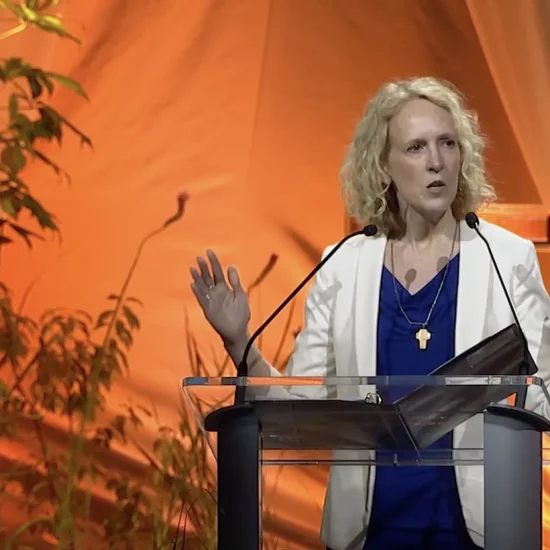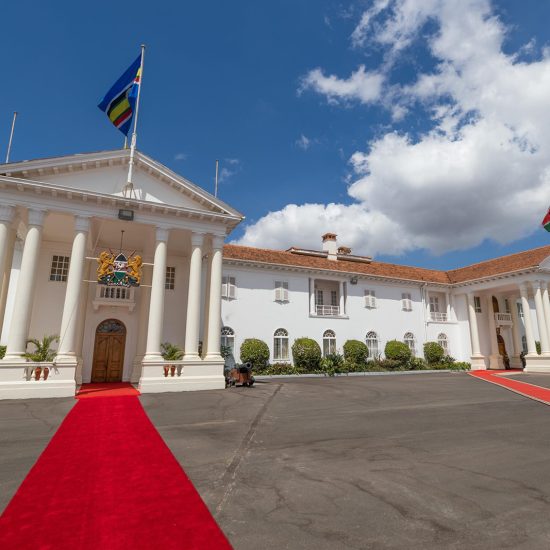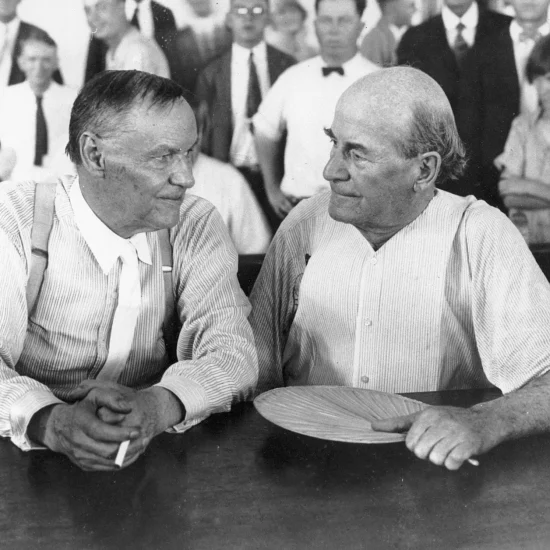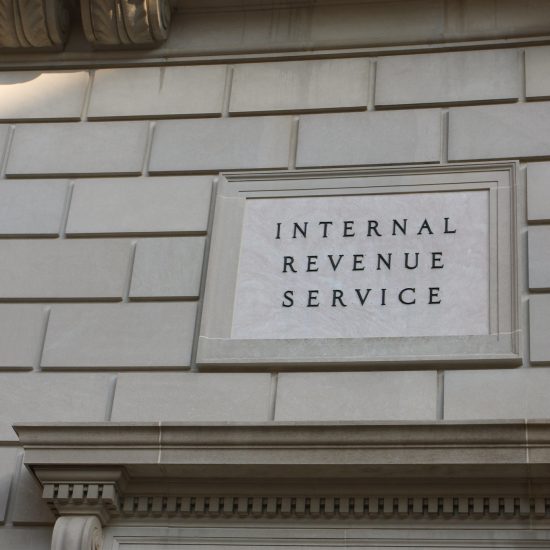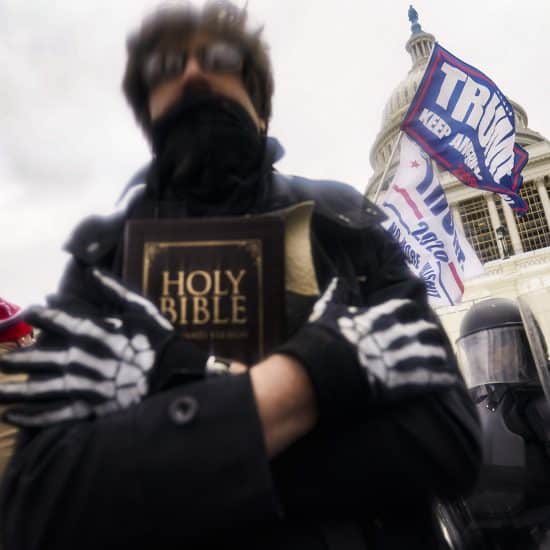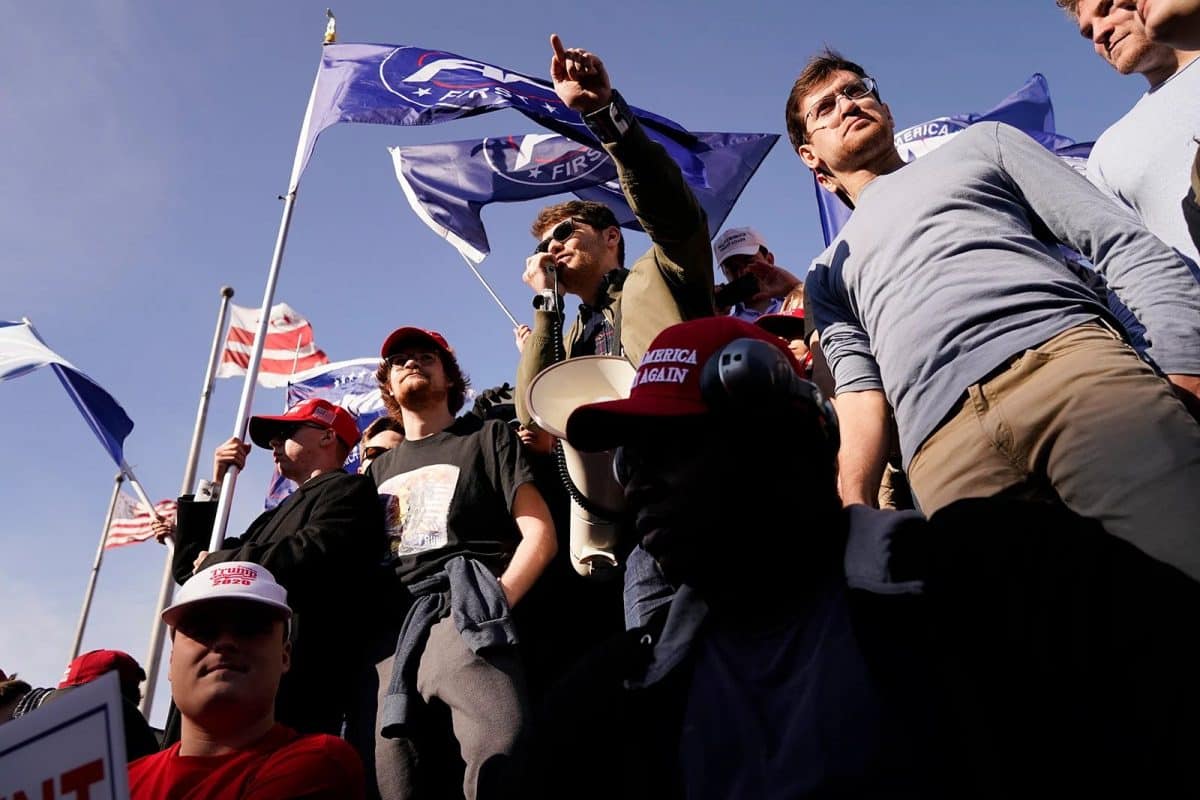
(RNS) — When supporters of former President Donald Trump rallied near the White House on Jan. 6 of last year, a boisterous pocket of young men waving “America First” flags broke into a chant: “Christ is King!” It was one of the first indications that Christian Nationalism would be a theme of the Capitol attack later that day, where insurrectionists prayed and waved banners that read “Proud American Christian.”
It also announced the presence of followers of Nick Fuentes, a 23-year-old White nationalist and former YouTube personality who was subpoenaed this month by the U.S. House of Representatives committee investigating the Capitol attack. (Though a person holding a flag reading “America First” — Fuentes’s personal brand — was among the first to barrel into the Senate chamber during the insurrection, there is no evidence Fuentes entered the Capitol himself.)

Nick Fuentes, center, speaks to supporters of President Donald Trump during a pro-Trump march Saturday, Nov. 14, 2020, in Washington, D.C. (Jacquelyn Martin/Associated Press)
“Christ is King” is not controversial in itself: The phrase is rooted in Christian Scripture and tradition. But Fuentes’s supporters have given it a different connotation. They have chanted it at anti-vaccine protests and the anti-abortion March for Life, some of them holding crucifixes aloft. It was heard in March, at an America First conference, where Fuentes delivered a speech saying America will cease to be America “if it loses its White demographic core and if it loses its faith in Jesus Christ.” Fuentes also declared the country “a Christian nation.”
The religious fervor of Fuentes’s followers is part of an unsettling resurgence of faith-based appeals among right-wing extremists in the aftermath of the insurrection. With so many ideological strands animating the far-right — including racism, antisemitism, and fervent nationalism — a shared affinity for Christian Nationalism has come to serve as a unifying element, scholars of extremism say. And as Christian Nationalism’s presence grows, experts are concerned it could expand extremism’s influence over other, more moderate conservative politicians and groups.
“Christian Nationalism — and even the idea of separatism, with a subtext of White, Christian and conservative-leaning — took a more dominant role in the way that extremist groups talk to each other and try to propagandize in public,” said Jared Holt, who studies extremism at the Atlantic Council’s Digital Forensic Research Lab.
Christian Nationalism has a deep history in America’s racist right-wing, said Kelly J. Baker, author of Gospel According to the Klan: The KKK’s Appeal to Protestant America, 1915-1930.
Fuentes’s rhetoric “could have come word for word from a Klan speech in 1922,” she said. “The Klan’s goal here was patriotism and nationalism, but it was combined with their focus on White Christianity.”
Intermingling patriotism and piety has become common even among groups better known for nationalist violence than adherence to a particular faith. The Proud Boys, a chauvinist organization whose members trampled and burned Black Lives Matter banners at Washington, D.C., churches a year ago, were spotted praying together the morning of the insurrection. A month earlier, “Rufio Panman” — aka, Ethan Nordean, currently facing federal charges stemming from Jan. 6 — compared Jesus’ crucifixion to “sacrificing ourselves for our country,” at an impromptu Proud Boys rally near the Washington Monument, according to footage provided to Religion News Service by independent journalist Dakota Santiago. Nordean and other Proud Boys knelt as another man prayed into a bullhorn, warning that anti-fascist activists known as antifa were “coming” for their children, freedom, culture, country and Constitution.
“God will watch over us as we become proud,” the man said. Proud Boys joined him in shouting “We love you, God!” to the sky.
Alex Bradley Newhouse, deputy director of Middlebury College’s Center on Terrorism, Extremism and Counterterrorism, said three Christian Nationalist movements have grown or enhanced their visibility since 2019: “Deseret nationalists,” a primarily Mormon group based in Utah; the inherently racist “Christian Identity” movement; and “dominionists,” a term used to describe Christians with theocratic political goals that now overlaps heavily with Christian nationalism. After the Capitol attack, the latter two have become markedly more popular, Newhouse said.
“Post-insurrection, we have 100% tracked the emergence of this Christian — revolutionary Christian — framework imposed or adopted by communities that have lost faith in the government,” Newhouse added.
A month before the insurrection, Oath Keepers leader Stewart Rhodes, who was arrested on sedition charges on Jan. 13 related to the Capitol attack, gave a speech at a faith-themed “Jericho March” event in Washington, D.C., where speakers espoused baseless claims about 2020 election fraud and trumpeted Christian nationalism. Christian Nationalism has also become common among anti-vaccine activists and the QAnon movement, which has prospered in evangelical Christian congregations.
Elizabeth Neumann, who served as assistant secretary of counterterrorism and threat prevention at the Department of Homeland Security in the Trump administration, told RNS the religious turn in extremist groups would have surprised her several years ago, but not anymore. Neumann resigned her government post in April 2020, claiming President Trump was dismissive of domestic terrorist threats, and now works with the Moonshot CVE Group, which studies violent extremism. Raised evangelical (she now rejects the label, preferring “follower of Christ”), she has expressed concern about radicalization in Christian communities and worked to combat it.
“The whole concept of ‘We need to secure our nation within its Christian heritage’ … It’s heretical,” she said. “If that is where you’re going to put your focus, I’m concerned for your soul and you might have missed the point of the Gospel. But it is also not without precedent that when people think that something is allowable because their religion calls for it, we do see violence come out of that.”
People who join violent groups are often searching for “belonging and significance,” said Neumann, explaining that modern versions of Christian nationalism can fill that vacuum for some. Besides faith, a strong unifying force has been social media, scholars said, which in turn fortifies adherence to Christian themes.
“This unification is pretty unprecedented,” said Newhouse. “The infusion of Christian Nationalism throughout that unification process has been particularly interesting and, in my opinion, is going to end up being pretty dangerous.”
Part of the danger, he explained, is that broader appeals to Christian nationalism may “disguise a much more dangerous uptick in adoption of Christian Identity” — an ideology that claims, among other things, that Jesus was a white Aryan and that the End Times will come about through a racial holy war.
According to Newhouse, prominent QAnon influencer “GhostEzra” began sending explicit Christian identity messages to his 300,000 Telegram subscribers after the Capitol attack. Christian Aryan memes, as well as references to the “two-seedline theory” — which contends the serpent in the Book of Genesis mated with Eve, creating two morally opposed races — began popping up in QAnon and Proud Boys channels. Newhouse also pointed to Kyle Chapman, who leads a sub-group connected to the Proud Boys known as the Fraternal Order of Alt-Knights. Newhouse said Chapman has been “blasting out Christian Identity propaganda” and interacting with Christian Identity influencers on Telegram, a social media website increasingly popular with the right.
“There’s this gradual move toward a more revolutionary, burn-it-all-down posture, and I think Christian Identity for a lot of these people has become a way for them to organize their thoughts,” he said.
The growth in Christian nationalism has translated into threats against the Jewish community. A recent study conducted by George Washington University’s Program on Extremism revealed a December 2021 Telegram post from St. Louis Proud Boys President Mike Lasater that read, “Our time is not up; it is the jewish hegemony whose days our (sic) numbered. This is a Christian nation; jews may be citizens of this country, but they are guests of our nation, and they should remember that.”
Experts stress that Christian Nationalism is not always synonymous with Christian Identity — a point made by some conservative Christians who want to differentiate their belief that the United States is a Christian nation from the Jan. 6 insurrectionists. But Baker argued that even relatively moderate Christian nationalism can encourage violent groups.
“A number of celebrity pastors who are involved in white Christian nationalism have tried to separate themselves from the violence,” she said, “but are not realizing they are part of the pipeline.”
Any appeal to Christian nationalist views, said Anthea Butler, chair of the department of religious studies at the University of Pennsylvania, can embolden extremists by giving the appearance — even unintentionally — of an “alliance” with church leaders.
Butler pointed to a November speech by U.S. Conference of Catholic Bishops President Archbishop José Gomez. The prelate, who has condemned racism and the insurrection, warned that America has lost its “story” — namely, one “rooted in a biblical worldview and the values of our Judeo-Christian heritage” that “underwrote America’s founding documents.”
Newhouse said there are signs that Christian nationalism’s rise is already pushing the “already radicalized” toward a “more violent posture.”
Andrew Torba, a conservative tech entrepreneur, has been venting what Newhouse described as an “extreme anti-modern version of Christian nationalism” on Gab, the alternative social media website Torba founded. Torba’s vision for a “parallel Christian society” has crossover appeal to “accelerationist authors” — people who hope to bring on the End Times by, among other things, provoking a race war, according to Newhouse.
Extremists have typically operated at the fringes of American politics, and calls for parallel societies sound as if these groups want to be left alone to believe as they like. Holt said Torba’s talk echoes calls for “a national divorce,” conjuring a country in which conservative Christians “might need to form their own communities apart from this broader society that they believe has been corrupted,” he said.
But some extremist Christian Nationalists are forging ties to establishment figures, including elected officials. Arizona Rep. Paul Gosar, the keynote speaker at Fuentes’ America First 2021 conference, tweeted “Christ is King” the same day he posted a widely condemned animated video that depicted him killing New York Rep. Alexandria Ocasio-Cortez. Gosar has sought to distance himself from Fuentes’s views, but after being disciplined by Congress for the video, the congressman encouraged his supporters to join Gab. One of the first people he followed on the platform was Fuentes, who he has since lauded as a “young conservative Christian” who is a victim of “political persecution” by the House committee investigating the Capitol attack.
“We will take back our country, and we will save America from the haters, the incompetents and the ones so intent on making us a godless nation,” Gosar wrote in a recent Gab post.
Meanwhile, as Fuentes prepares for the 2022 iteration of his “America First” conference, Torba announced in late January that Gab would be an official sponsor of the event.
“Everyone who will be going is a member of this website, promotes Christian values, openly proclaims the name of Jesus Christ, and promotes America First political objectives, candidates, and members of Congress,” Torba wrote on Gab. He added that he believes the event brings together “Christian thinkers” who are “the future of the right wing in this country.”
And while extremists may live on the fringe ideologically, Butler said, an unsettling aspect of Christian Nationalism is that radicalized devotees often rub elbows with everyday believers.
“That person is sitting next to you in the pew,” she said.

